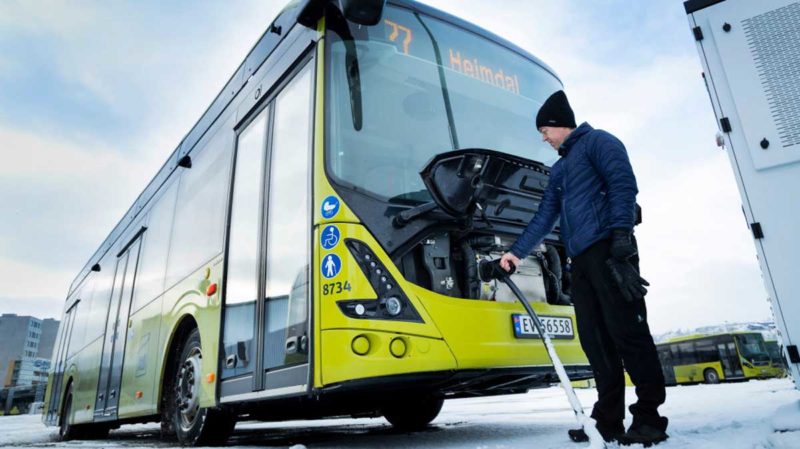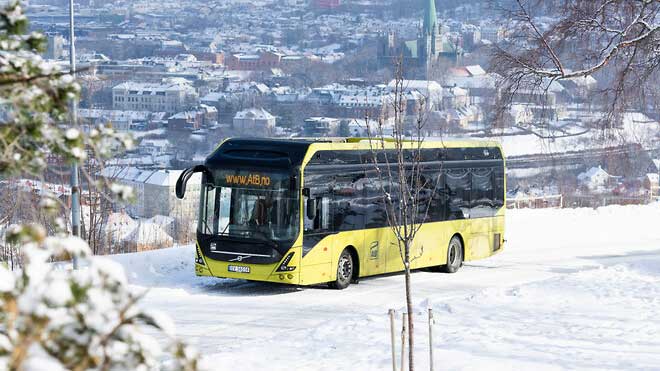Busmaker Volvo Buses’s electric buses will reportedly be the first to operate north of the Arctic Circle starting this northern summer.
Scheduled to commence operating in the Norwegian town of Bodø, a good 16 hour drive north of the capital of Oslo, the fleet will reportedly consist of 31 electric buses in total to service the population of approximately 50,000 residents.
This will be made up of 17 12-metre Volvo 7900 Electric models, and 14 large capacity Volvo 7900 electric articulated buses which can carry up to 120 passengers.
According to Volvo Buses, the agreement with Nordlandsbuss which handles operation of the electric buses came about after a thorough analysis of Bodø’s extreme climate and terrain.
“Every city is unique and in order to create an optimal solution, it is vital that everything is properly designed to suit local conditions and needs,” said Svenn-Åge Lökken, sales director at Volvo Buses in Norway said in a statement when the order was first announced in September.
“For that reason our initial analysis, including route simulation, plays a crucial role in our business model. Topography, route frequency and proximity to the depot and workshop are other important considerations in our offer.”
“This is the largest sustainability project for road transport in northern Norway, and it is of immense significance for both the region and for us,” Anders Mjaaland, administrative director of Saltens Group, owner of Nordlandsbuss.

Charging infrastructure for the project will be delivered by Swedish-Swiss electrification and automation conglomerate ABB, which has a range of electric bus chargers and pantographs, that can be installed on routes or in bus depots.
In today’s confirmation that the planned Bodø fleet deployment is still going to plan, Volvo took an opportunity to underline the lengths the company goes to in testing its range of electric buses.
“As one of the leading global suppliers of solutions for electric mobility, we must be able to meet our customers’ requirements and expectations regardless of where they operate,” said Marie Carlsson, director of business development at Volvo Buses in a statement.
“That applies not only to environmental considerations but also availability, passenger comfort and safety. We test our products together with our customers in Arctic conditions and in warm climates to ensure that we have the best solutions for a range of different requirements,” she said.
In addition to its cold weather testing, Volvo also tested its fully electric Volvo 7900 Electric bus in the Spanish cities of Zaragoza, Santander and Madrid in July 2020, with the ambient temperature during the test period sometimes exceeding 40°C.
It is also currently testing a 7900 Electric bus in Mexico City, which will be in operation for six months total.
The buses being tested differ from the Volvo electric buses due to be trialed in 2022 on Perth’s busy Joondalup route.
These instead will be Volgren-made buses built partially in Australia using locally manufactured bus bodies and chassis’ based on established Volvo technology already implemented in Europe.
This article has been updated to correct the name and description of Volvo Buses.
Bridie Schmidt is lead reporter for The Driven, sister site of Renew Economy. She has been writing about electric vehicles since 2018, and has a keen interest in the role that zero-emissions transport has to play in sustainability. She has participated in podcasts such as Download This Show with Marc Fennell and Shirtloads of Science with Karl Kruszelnicki and is co-organiser of the Northern Rivers Electric Vehicle Forum. Bridie also owns a Tesla Model 3 and has it available for hire on evee.com.au.
Source: https://thedriven.io





